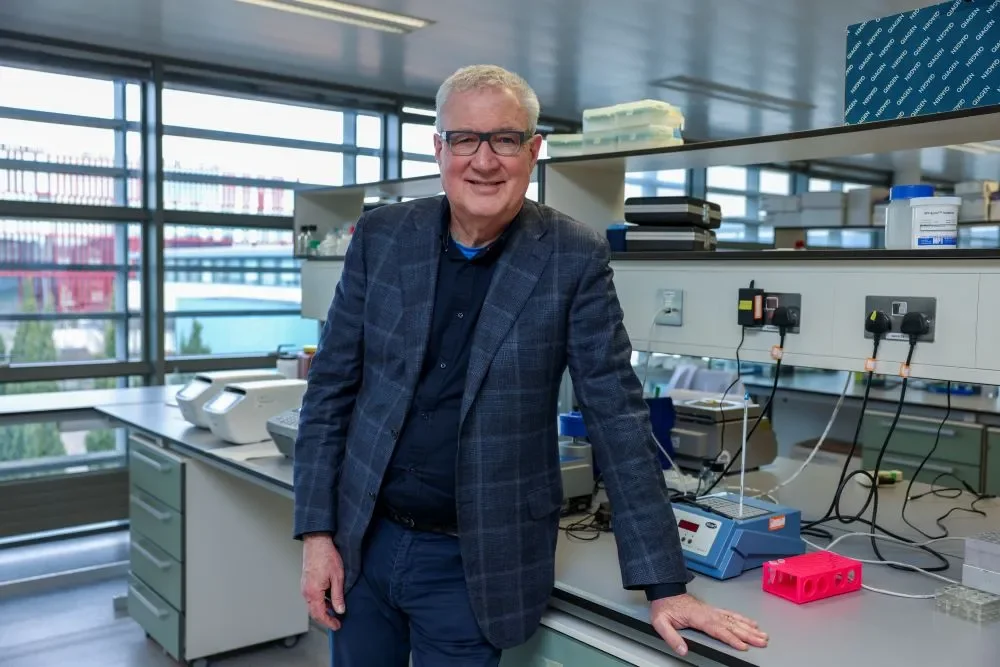

Professor John Crown receives prestigious cancer research award
Prof Crown is being awarded the Irish Association for Cancer Research (IACR) Outstanding Contribution to Cancer Medicine & Research Award for his cancer research at the prestigious EACR-AACR-IACR BASIC AND TRANSLATIONAL RESEARCH CONFERENCE (EAI2024) meeting this week at the Convention Centre (www.eai2024.org).
Prof Crown, who worked in the USA for a number of years before returning in 1993 to work at St Vincent’s Hospital in Dublin 4 said that he would not have received the award without his collaboration with DCU. Back then, he was one of just four medical oncologists in Ireland when he met with Professor Martin Clynes, now DCU Emeritus Professor in Biotechnology, and they decided they would work together. The relationship has continued ever since.
“DCU did not have a clinical outlet, as it didn’t have a medical school, while Saint Vincent’s had some good individuals but not a well developed cancer research infrastructure,” recalled Prof Crown. “We saw synergies and got the two working together on a number of studies.”
Around this time, said Prof Crown, a revolution was taking place in cancer care, with more focus on why cancer cells behaved as they did. People were starting to develop treatments beyond chemotherapy, he said, and DCU became a part of that, with younger colleagues like Dr Norma O’Donovan, Dr Alex Eustace, Dr Naomi Walsh, Dr Denis Collins, Dr Robert O’Connor, and Dr Neil Conlon all leading the way.
Dr O’Donovan, said Prof Crown, developed skills in culturing and growing cancer cells in dishes. “She was able to do a number of experiments where we would ask her to develop models for looking at new combinations of treatments in cancer cells that we might then take into clinical trials in people. She deserves huge credit for everything we’ve done at DCU.”
Links were forged between DCU and UCLA in California, and the lab of the renowned Dr Denis Slamon, regarded as the founder of the field of molecular treatment for breast cancer, which involved identifying and exploiting a weakness that some breast cancer cells have.
In 2001, Prof Crown was offered a position as the Thomas Baldwin Chair of Translational Cancer at DCU. This emerged out of a working relationship with Prof Clynes for a number of years previously. In the 23 years since his appointment, he said, cancer treatment has changed immensely.
“Prior to that, people in the lab were doing lab research and people in the hospital were doing clinical research and there wasn’t a great deal of overlap between them. With breast cancer the outcome has improved enormously and surprisingly the outcome for lung cancer has improved quite a bit in recent years. That has been mainly due to immunotherapy.”
“The story of immunotherapy is fascinating. In a nutshell, over multiple decades there was an assumption that the reason the immune system didn’t do a better job with cancer was that it had been designed by nature, evolution or God, to deal with foreign invaders, but it wasn’t there to deal with our own cells gone rogue. That was a misunderstanding.”
“In fact, the immune system was capable of recognising cancer cells as being something that shouldn’t be there, something foreign. For a couple of cancers, the effect of immune treatment has been absolutely magnificent. Malignant melanoma, a common cancer in Ireland is skyrocketing in incidence. When it is picked up early it is usually cured, but if it spreads, historically it had a very poor survival rate. Now, with the new immune therapies perhaps 50-60% of patients with widespread cancer are alive and well five years later.”
As well as new treatments, Prof Crown believes that a lot more could be done on cancer prevention. He would like to see smoking eliminated altogether, while, he says when it comes to being safe from cancer, it’s better not to drink alcohol at all. The role of alcohol in liver, pancreas, oesophageal and head a neck cancer is well established, but evidence is emerging that it also has a role in breast cancer, and indirectly in many other cancers too. Sunlight exposure is a risk factor too, as is HPV infection, and being overweight or obese.
There are a lot of opportunities to get better at preventing and treating cancer, said Prof Crown, but he also believes that cancer will always be with us, in some form. “As we get better at not dying from heart disease or tuberculosis as we live longer, cancer will be there. It is primarily a disease of middle aged and elderly people so as we will have more elderly people we will have more cancer.”
Prof Crown said that he’ll collaborate with DCU for as long as he can, and as long as DCU wants him. “I’m not a laboratory scientist, I’m a medical scientist. I do know a lot about the scientific aspects of oncology. Every now and then if you have an idea you can bounce it off the guys and we can test that idea. A number of our treatments arose in that way.”
